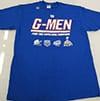Blog
TTAB blitzes football powerhouses
First the Redskins, and now the Giants. The New York Football Giants, Inc. ("Giants") applied to register their nickname G-MEN for "Shirts; T-shirts; Tops" in Class 25.
 The Patent and Trademark Office ("PTO") refused registration of the G-MEN mark based on a likelihood of confusion under Section 2(d) of the Trademark Act with the prior registered mark GMAN SPORT and Design for "Boxer shorts; Socks; T-shirts; Tank tops," also in Class 25. The Giants threw out the red flag and challenged the PTO's ruling to the Trademark Trial and Appeal Board ("TTAB"), arguing that its G-MEN mark is so famous for its football team that, when applied to football related merchandise, it has a unique and singular meaning for a distinct set of products that will avoid a likelihood of confusion with the prior registered GMAN SPORT and Design mark. In assessing likelihood of confusion, the Giants argued that the PTO should not limit its analysis to the marks and identifications of goods claimed in the application, but rather must take into account "marketplace realities" even if those marketplace realities are not reflected in the contested application.
The Patent and Trademark Office ("PTO") refused registration of the G-MEN mark based on a likelihood of confusion under Section 2(d) of the Trademark Act with the prior registered mark GMAN SPORT and Design for "Boxer shorts; Socks; T-shirts; Tank tops," also in Class 25. The Giants threw out the red flag and challenged the PTO's ruling to the Trademark Trial and Appeal Board ("TTAB"), arguing that its G-MEN mark is so famous for its football team that, when applied to football related merchandise, it has a unique and singular meaning for a distinct set of products that will avoid a likelihood of confusion with the prior registered GMAN SPORT and Design mark. In assessing likelihood of confusion, the Giants argued that the PTO should not limit its analysis to the marks and identifications of goods claimed in the application, but rather must take into account "marketplace realities" even if those marketplace realities are not reflected in the contested application.
Using that marketplace standard, the Giants asserted that its G-MEN mark, when used for football related merchandise, "has a unique, unmistakable marketplace meaning" associated with the famous football team, that the G-MEN and GMAN SPORT marks are different based on that marketplace meaning, that the G-MEN mark is used in the marketplace with the famous GIANTS and NFL trademarks, that the goods sold in the marketplace are different, namely, G-MEN football merchandise and GMAN SPORT underwear, that the marketplace channels of trade for the G-MEN football merchandise are different, e.g., authorized NFL retailers and NFL team stadium shops, and that NFL football fans are sophisticated consumers that purchase fan merchandise based on association with their favorite football team.
On July 3, 2014, in In re New York Football Giants, Inc., Serial No. 85599795 [not precedential], the TTAB rejected the Giants' marketplace realities standard as contrary to decades of precedent. Under that precedent, "the Board is required...to analyze likelihood of confusion based on the involved identifications [of goods], broadly construed." As a result, in considering similarity or dissimilarity of the goods, the Board cannot consider alleged "marketplace realities," but rather must look to how those goods are "described in an application or a registration." Accordingly, while the Giants may use the G-MEN mark for football merchandise sold in association with the GIANTS football team through authorized NFL retailers and team stadium shops to GIANTS fans, the contested application was for "Shirts; T-shirts; Tops" alone in Class 25 without any restriction as to the types of goods, the channels of trade, or the consumers. "[B]ecause the scope of the registration that applicant seeks is defined by its application (and not by its actual use) it is the application (and not its actual use) that we must look to in determining the applicant's right to register."
Relying on the application alone, the Board found that the goods were identical in part and therefore presumed to move through the same channels of trade to be sold to the same classes of consumers. Likewise, the Board also rejected evidence as to the dissimilarity of the marks that was based on factors not reflected in the application, such as the fame of G-MEN as a nickname for the football team since the identification of goods was not restricted to football merchandise, or the use of G-MEN with other indicia of origin since those other indicia did not form a part of the mark sought to be registered. Given the standard applied, the Board concluded that a likelihood of confusion existed between G-MEN and G-MAN SPORT for the goods claimed, and affirmed the PTO's decision.
The opinions expressed are those of the authors on the date noted above and do not necessarily reflect the views of Fish & Richardson P.C., any other of its lawyers, its clients, or any of its or their respective affiliates. This post is for general information purposes only and is not intended to be and should not be taken as legal advice. No attorney-client relationship is formed.